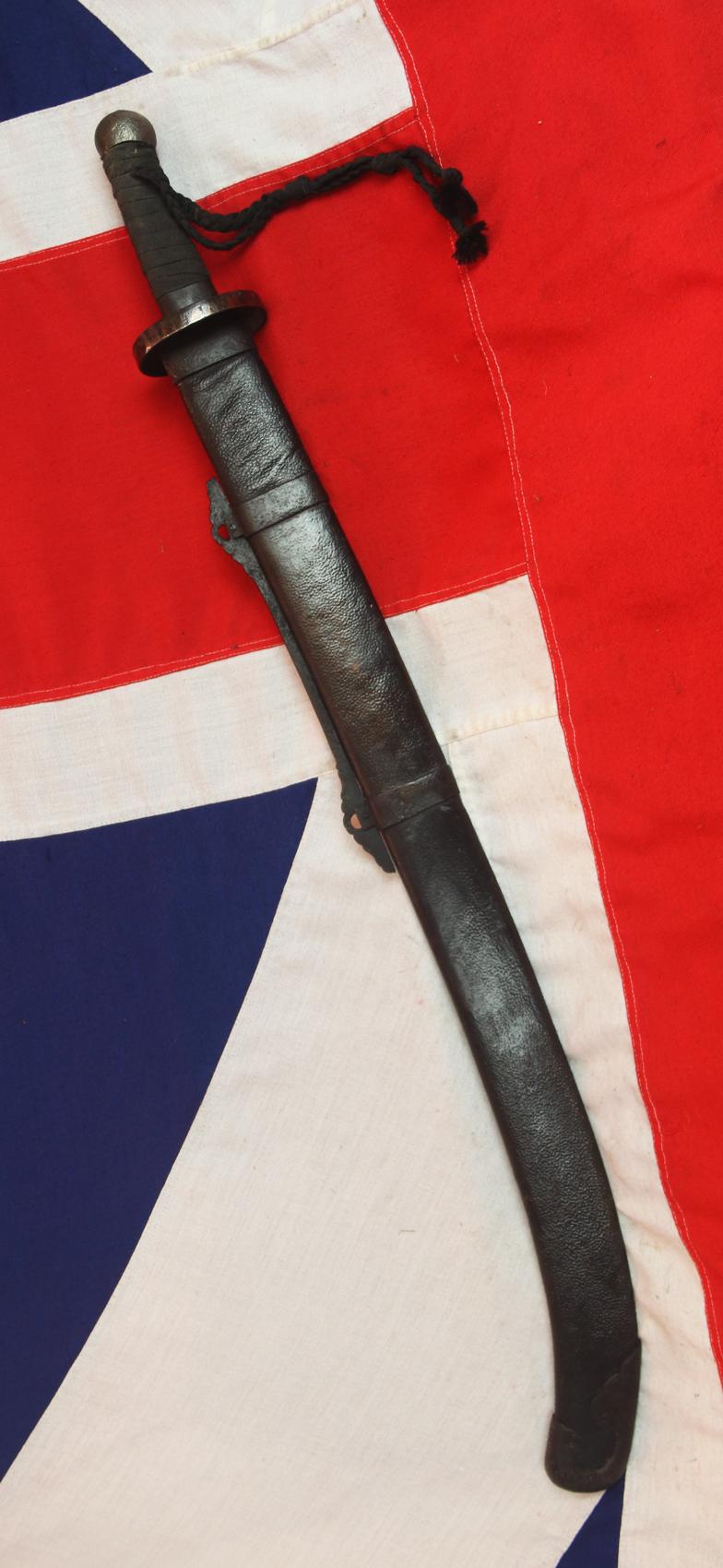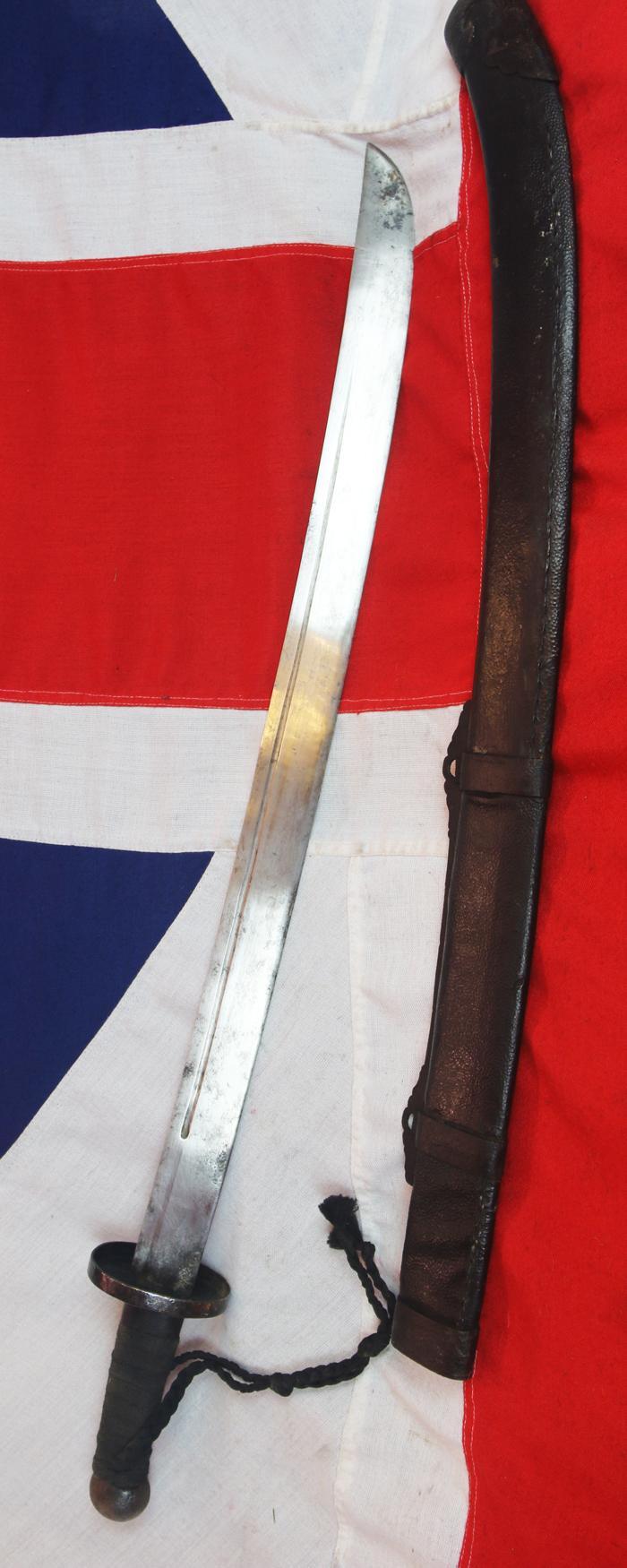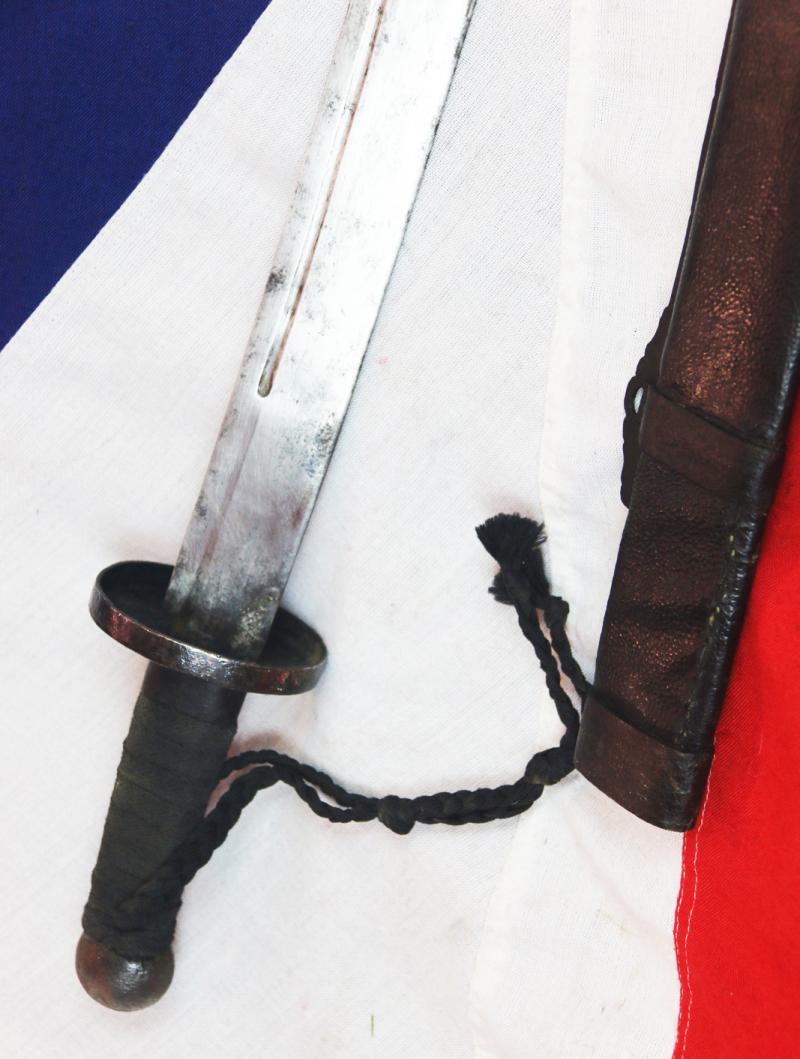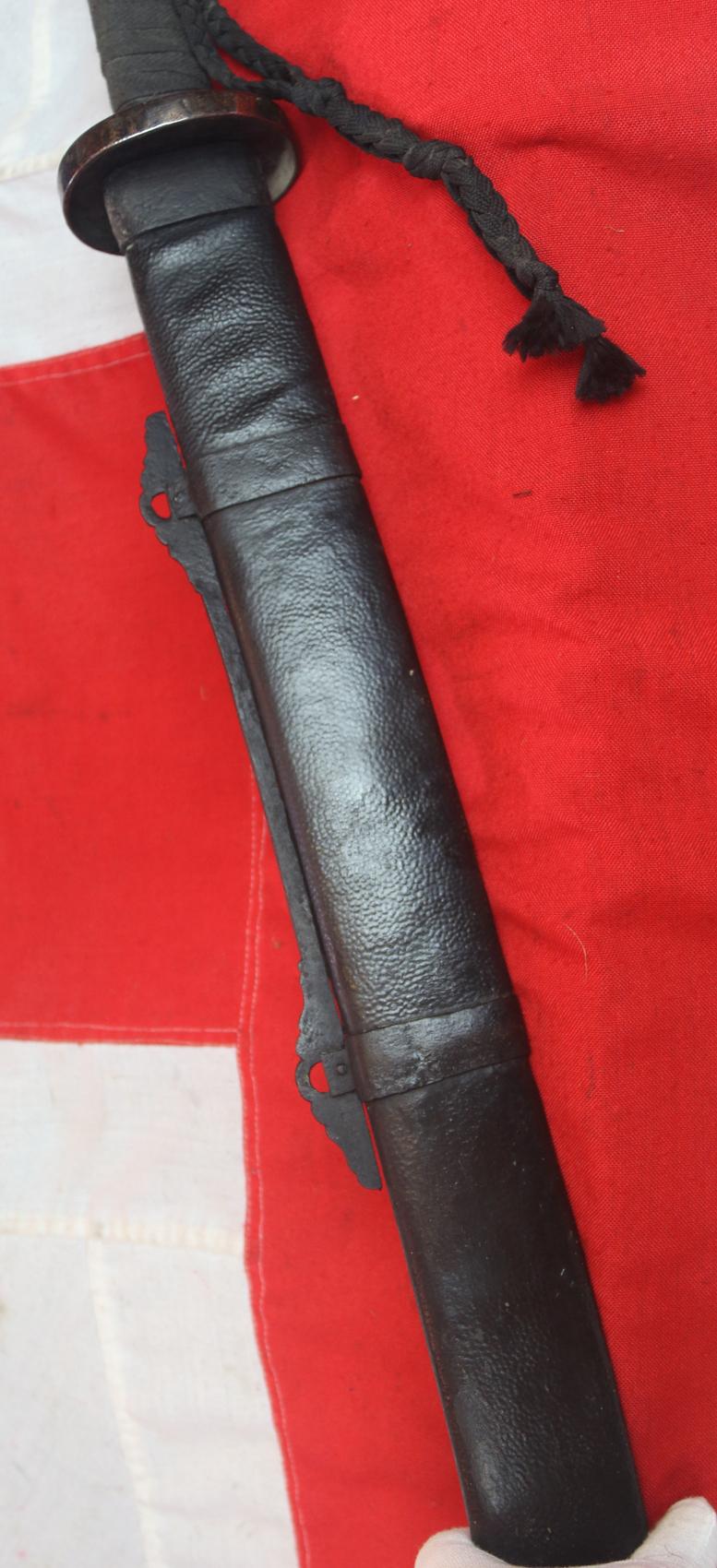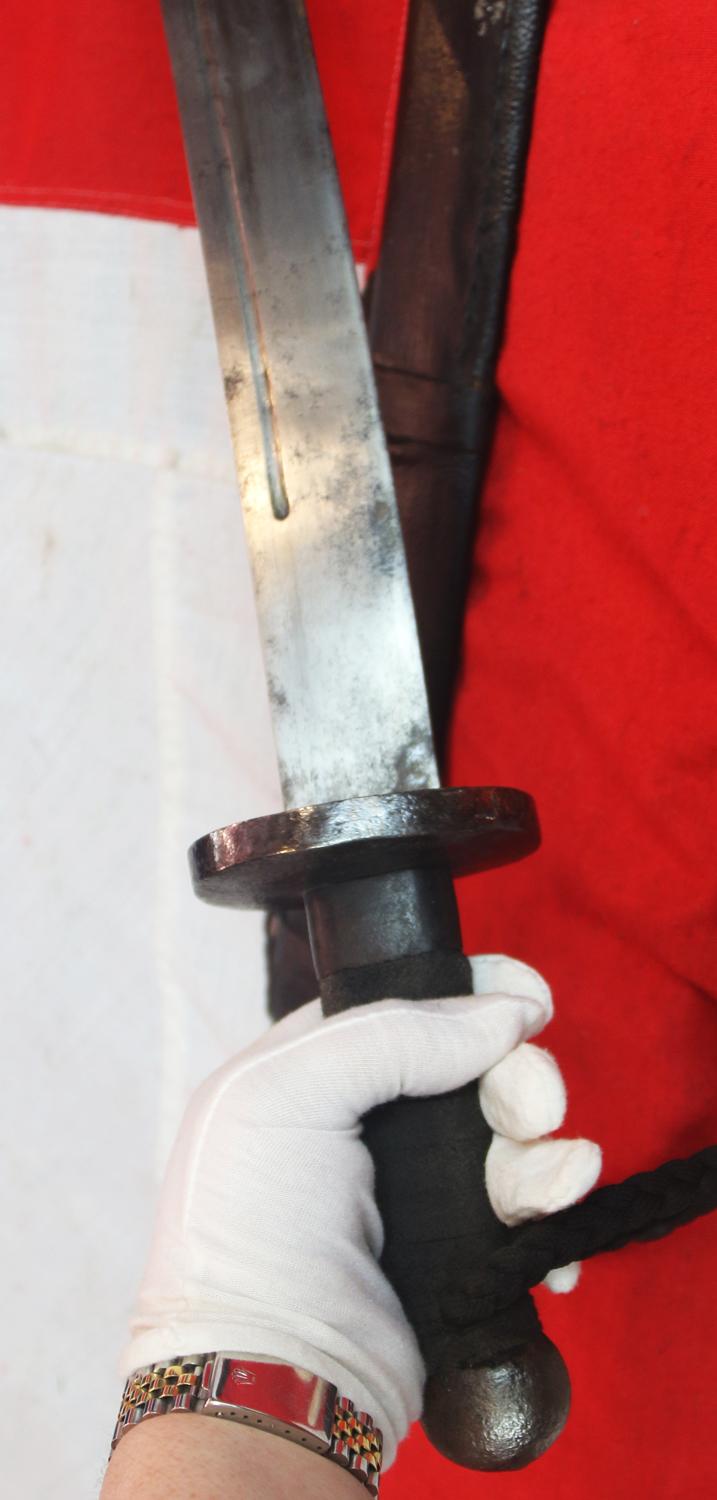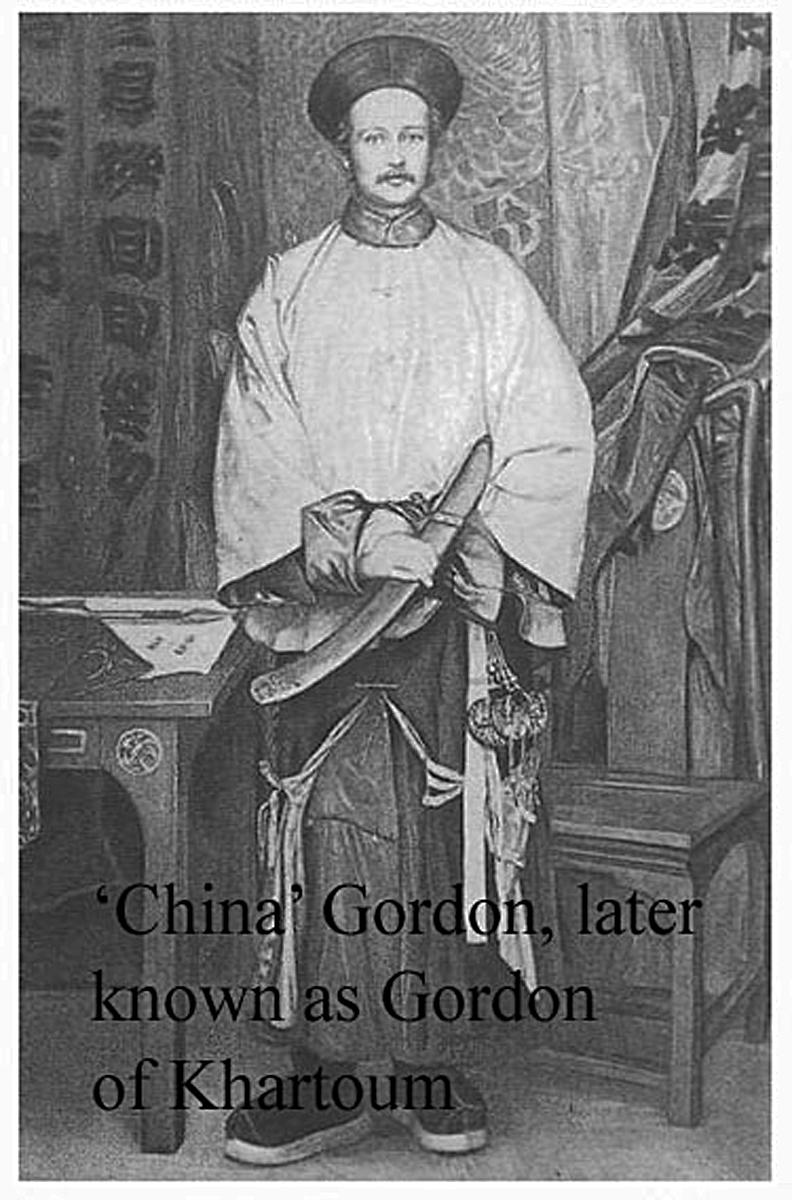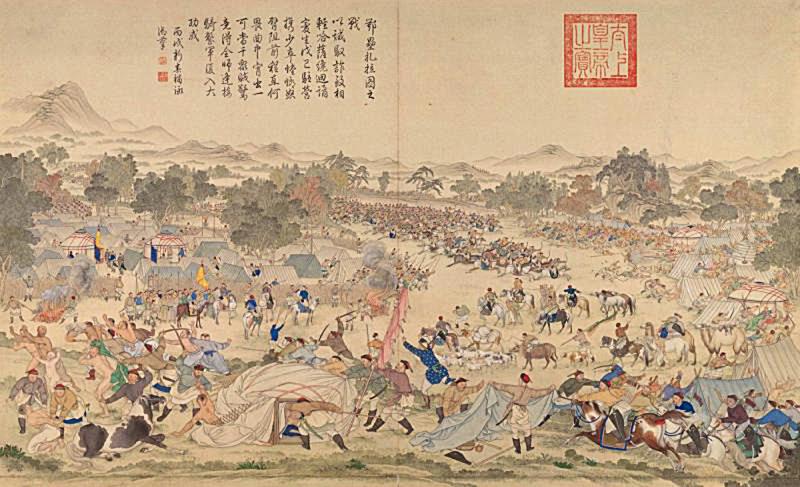A Fine Scarce, Antique, Chinese Dadao Sword, Ching Dynasty. Used From the Opium Wars and The Boxer Rebellion. The Ching or Qing Dynasty Was Founded From 1644 and Ruled Until 1912.
A big and impressive sword with a long single edged blade. Black iron mounts to the leather bound scabbard and sword guard, round pommel wide cord wrapped grip, with plaited sword knot. Made in the Ching {Qing} Dynasty. Used during the Taiping Rebellion, the Opium Wars and into the Boxer Rebellion era, and most likely brought back to England by a soldier that either served in the Taiping Rebellion the Opium War, or defended the legations at the siege in Peking.
This weight of sword was frequently used not only in battle but for executions. All black finish.
The Taiping Rebellion was a widespread civil war in southern China from 1850 to 1864, led by heterodox Christian convert Hong Xiuquan, who having received visions, maintained that he was the younger brother of Jesus Christ against the ruling Manchu-led Qing Dynasty. About 20 million people died, mainly civilians, in one of the deadliest military conflicts in history.
Hong established the Taiping Heavenly Kingdom, officially the "Heavenly Kingdom of Great Peace", with its capital at Nanjing. The Kingdom's army controlled large parts of southern China, at its height containing about 30 million people. The rebels attempted social reforms believing in shared "property in common" and the replacement of Confucianism, Buddhism and Chinese folk religion with a form of Christianity. The Taiping troops were nicknamed "Long Hair" by the Qing {Ching} government. The Taiping areas were besieged by Qing forces throughout most of the rebellion. The Qing government crushed the rebellion with the eventual aid of French and British forces. The Opium Wars, also known as the Anglo-Chinese Wars, divided into the First Opium War from 1839 to 1842 and the Second Opium War from 1856 to 1860, were the climax of disputes over trade and diplomatic relations between China under the Qing Dynasty and the British Empire. After the inauguration of the Canton System in 1756, which restricted trade to one port and did not allow foreign entrance to China, the British East India Company faced a trade imbalance in favour of China and invested heavily in opium production to redress the balance. British and United States merchants brought opium from the British East India Company's factories in Patna and Benares, in the Indian state of Bengal, to the coast of China, where they sold it to Chinese smugglers who distributed the drug in defiance of Chinese laws. Aware both of the drain of silver and the growing numbers of addicts, the Dao Guang Emperor demanded action. Officials at the court who advocated legalization of the trade in order to tax it were defeated by those who advocated suppression. In 1838, the Emperor sent Lin Zexu to Guangzhou where he quickly arrested Chinese opium dealers and summarily demanded that foreign firms turn over their stocks. When they refused, Lin stopped trade altogether and placed the foreign residents under virtual siege, eventually forcing the merchants to surrender their opium to be destroyed. In response, the British government sent expeditionary forces from India which ravaged the Chinese coast and dictated the terms of settlement. The Treaty of Nanking not only opened the way for further opium trade, but ceded territory including Hong Kong, unilaterally fixed Chinese tariffs at a low rate, granted extraterritorial rights to foreigners in China which were not offered to Chinese abroad, a most favoured nation clause, as well as diplomatic representation. When the court still refused to accept foreign ambassadors and obstructed the trade clauses of the treaties, disputes over the treatment of British merchants in Chinese ports and on the seas led to the Second Opium War and the Treaty of Tientsin.
Hero of China, British General Gordon, was presented with an identical example, and he is carrying his, while dress in his Chinese garb, in the picture shown in the gallery. He was known affectionately as "Chinese" or "China" Gordon. Overall very good condition. He later became known as Gordon of Khartoum, as he was assassinated by the Mahdi's warriors at the end of the siege of Khartoum
The Qing dynasty, officially the Great Qing, was the Manchu-led last dynasty in the imperial history of China. It was proclaimed in 1636 in Manchuria, in 1644 entered Beijing, extended its rule to cover all of China proper, and then extended the empire into Inner Asia. The dynasty lasted until 1912. The Qing Dynasty fell in 1911, overthrown by a revolution brewing since 1894 when western-educated revolutionary Sun Zhongshan formed the Revive China Society in Hawaii, then Hong Kong. In 1911, the Nationalist Party of China held an uprising in Wuchang, helped by Qing soldiers, and 15 provinces declared their independence from the empire. Within weeks the Qing court agreed to the creation of a republic with its top general, Yuan Shikai, as president.
Xuantog abdicated in 1912, with Sun creating a provisional constitution for the new country, which ushered in years of political unrest centered around Yuan.
In 1917, there was a brief attempt to reinstate the Qing government, with Xuantog being restored for less than two weeks during a military coup that ultimately failed.
The Boxer Rebellion, more properly called the Boxer Uprising, or the Righteous Harmony Society Movement was a violent anti-foreign, anti-Christian movement called the "Society of Righteous and Harmonious Fists" in China, but known as the "Boxers" in English. The main 'Boxer' era occurred between 1898 and 1901. This fascinating era was fairly well described in the Hollywood movie classic ' 55 Days in Peking' Starring Charlton Heston and David Niven. The film gives a little background of Ching Dynasty's humiliating military defeats suffered during the Opium Wars, Sino-French War and Sino-Japanese war or the effect of the Taiping Rebellion in weakening the Ching Qing Dynasty. However, situations in which the various colonial powers exerted influence over China (a great source of outrage that drove many Chinese to violence) are alluded to in the scene in which Sir Arthur Robinson and Major Lewis visit the Empress after the assassination of the German minister.
* Dowager Empress - "….the Boxer bandits will be dealt with, but the anger of the Chinese people cannot be quieted so easily. The Germans have seized Kiaochow, the Russians have seized Port Arthur, the French have obtained concessions in Yunnan, Kwan See and Kwantang. In all, 13 of the 18 provinces of China are under foreign control. Foreign warships occupy our harbours, foreign armies occupy our forts, foreign merchants administer our banks, foreign gods disturb the spirit of our ancestors. Is it surprising that our people are aroused?"
* Sir Arthur Robinson - "Your Majesty if you permit me to observe, the violence of the Boxers will not redress the grievences of China"
* Dowager Empress - "China is a prostrate cow, the powers are not content milking her, but must also butcher her."
* Sir Arthur Robinson - "If China is a cow your majesty, she is indeed a marvelous animal. She gives meat as well as milk…." The Dadao was continually used by Chinese Nationalist Army in the 1930's. the Pictures in the gallery of the Boxers 1900 and the combat in the siege.
Code: 25382
1295.00 GBP

